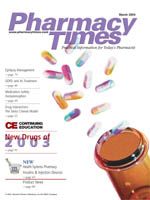Publication
Article
Pharmacy Times
Human Growth Hormone in the OTC Market
Author(s):
Growth hormone (GH) is a naturally occurring hormone secreted by the pituitary gland. Levels of GH naturally decline with age. In some people, however, a deficiency of GH causes several health problems, such as impaired growth. Replacement GH was originally obtained from cadavers for medical use; however, this source was contaminated with substances that caused Creutzfeldt-Jakob disease. Biosynthetic GH, of recombinant DNA origin, has been available for prescription use in the United States since 1985.1 It is used for the following conditions: growth hormone deficiency (GHD), Turner's syndrome, chronic renal insufficiency, small for gestational age or intrauterine growth retardation, Prader-Willi syndrome, continued height deficit at puberty, and cachexia or AIDS wasting.1,2
Whereas GH is approved for the previously listed disorders, there is growing interest in using GH therapy as a means to treat chronic fatigue syndrome, fibromyalgia, battered- wife syndrome, and obesity. This therapy also has picked up interest as an athletic performance enhancer and as an antiaging treatment,1 and it is heavily marketed in the OTC realm for both of these uses. The FDA has not approved GH for these applications and disorders. Further studies need to be done to determine the efficacy and risks; however, GH-related products are still being used extensively in the OTC market, and these products will be discussed in this article.
The decline in GH associated with age contributes to increased visceral adipose tissue, decreased lean body mass, decreased bone mass, reduced exercise capacity, and thinning of the skin.1,3 The absence of GH in those with GHD also is associated with an increase in cardiovascular risk factors.1 It is thought that replacing growth hormone will counteract the normal processes of aging. The purpose of using GH-related products as athletic performance enhancers is to achieve the same results?decreased body fat and increased muscle mass to possibly increase the level of performance.
To actually sell growth hormone without a prescription or as a dietary supplement is illegal. Section 303F of the US Federal Food, Drug, and Cosmetic Act prohibits the distribution or possession with the intention of distributing human growth hormone without a medical condition that requires treatment. If someone does distribute or possess it illegally, he or she may face imprisonment and a fine.4
There are many homeopathic products available, however, that claim to provide a diluted form of growth hormone. The sale of the homeopathic products as OTC products is legal, as stated in the Compliance Policy Guide from the FDA in Section 400.400. This document states that "a homeopathic drug is any drug labeled as homeopathic which is listed in the Homeopathic Pharmacopeia of the United States (HPUS), an addendum to it, or its supplements."5 To be included in the HPUS, a drug must meet at least the following criteria: (1) it must be "safe and effective"; (2) it must be "prepared according to specifications of the General Pharmacy and relevant sections of the HPUS"; and (3) "submitted documentation must be in an approved format as set forth in the relevant sections of the HPUS and must include any data relevant to toxicity."6
Homeopathic Products
There are many oral homeopathic GH (HGH) products available without a prescription. There also are HGH creams that penetrate the skin and go directly into the bloodstream. These creams are mainly used as antiaging products. Product manufacturers claim that this homeopathic form of GH will stimulate the pituitary gland to release more GH and that it is virtually free of side effects.
Enhancer Products (hGH Boosters)
These products are often called GH secretagogues; they come in pill or powder form. They contain no GH, but, instead, amino acids that manufacturers claim cause the body to increase the production of GH. Common amino acids in these products are glutamine, arginine, ornithine, phenylalanine, and lysine. These substances are used in many sports supplements. Enhancer product manufacturers claim that they are virtually free of side effects and safe; however, limited studies have been done to prove their efficacy and safety. There is also an enhancer available in a liquid form that is sprayed under the tongue, in the mouth, or in the nose. Again, no studies have been done to prove that this therapy is safe and effective.
The prices of these products range from $30 to $200 per month. Of note, many other OTC products claim to contain GH-related products but do not contain any hormone or ingredient to promote growth at all.
Potential Risks
Growth hormone use is not without potential risks and side effects. The prescription GH products are associated with swelling of the hands and feet and musculoskeletal pain that is usually self-limiting or can be treated with analgesics.1,2 These products also are linked with the development of carpal tunnel syndrome.1,2 Thyroid function should be monitored, as well as glucose levels in diabetic and nondiabetic patients, because GH can induce insulin resistance. Other conditions that have been associated with the prescription products are gynecomastia, intracranial hypertension, and development of antibodies to the growth hormone protein.2
Side effects, although rare, have been seen with use of the OTC products as well. They include elongation of the forehead, hands, and feet; overgrowth of the elbows or jaw; thickening of the skin; and insulin resistance.7 Because little information is available on the actual formulations contained in the OTC products, the full benefit and potential dangers of use are not yet known. The patient has a right to know the risks of using these products and that the possible benefits may not outweigh the risks.
What to Believe
Many companies use the prescription product (the injectable form of GH) data and apply it to the homeopathic OTC products. To do so is a violation of FDA and Federal Trade Commission regulations and can be considered misbranding. The FDA requires that information presented must be based on the exact product being sold. Pharmacists should be careful when looking at "supporting data." Although these products sound good in advertisements, there is little and conflicting evidence that these products actually work.
For a list of references, send a stamped, self-addressed envelope to: References Department, Attn. D. Ryan, Pharmacy Times, 241 Forsgate Drive, Jamesburg, NJ 08831; or send an e-mail request to: [email protected].

Newsletter
Stay informed on drug updates, treatment guidelines, and pharmacy practice trends—subscribe to Pharmacy Times for weekly clinical insights.






